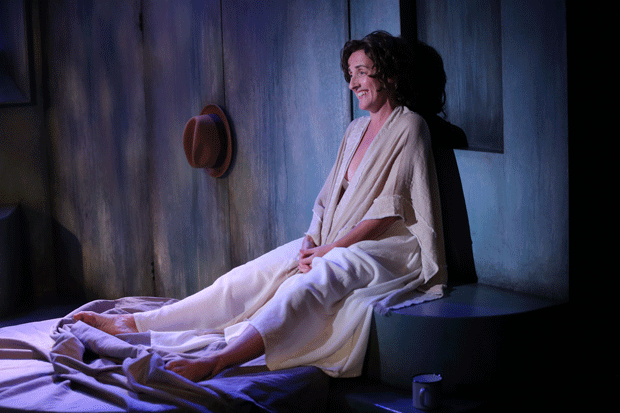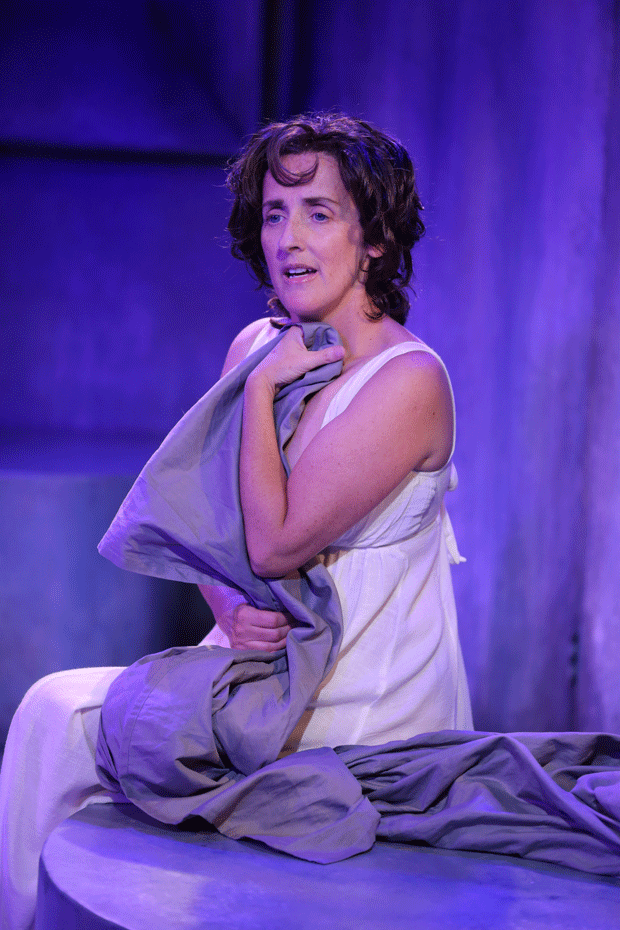Joyce's Penelope Comes to Life Onstage in Yes! Reflections of Molly Bloom

(© Carol Rosegg)
Few works of literature have captivated readers more than the final chapter of James Joyce's 1922 novel Ulysses, an epic reimagining of Homer's Odyssey that takes place in Dublin during a single day in the early 20th century. With beautiful, haunting poetry and deep, unflinching insight into one woman's thoughts and desires, the "Penelope" episode (as it is often called) follows the stream-of-consciousness musings of Molly Bloom as she lies in bed in the early morning hours of June 17, 1904, just after her husband, Leopold, has returned home.
Molly's chapter is often read at events commemorating the anniversary of Bloomsday, celebrated around the world by Joyceans on June 16, the day when most of the action of the novel takes place. The Penelope episode is an ecstatic Song of Songs, a paean to life — standing in stark contrast to the angst-ridden, cerebral, male-dominated chapters that precede it — and follows Molly's swiftly moving thoughts about age, mortality, and God as they crisscross with memories of her childhood in Gibraltar and frankly described erotic fantasies. Read aloud, it is a sensual experience for the ear, but when performed as exquisitely as it is by Aedín Moloney in Irish Repertory Theatre's production of Yes! Reflections of Molly Bloom, it becomes an unforgettable experience for the eye as well.
Moloney and Colum McCann have adapted the text for the stage and gathered its most famous passages and scenes into an exuberant 75-minute soliloquy. Director Kira Simring keeps things simple so that we can focus on Joyce's words as Moloney brings them to life. Charlie Cororan's dreamlike set shows us the interior Molly's mind, furnished with geometrical-shaped fixtures and designed in a modern, brutalist aesthetic. Leopold's fedora, symbolic of his travels, hangs conspicuously from a closet door knob.

(© Carol Rosegg)
Wearing a simple, white nightgown (costume design by Leon Dobkowski) that becomes diaphanous in Michael O'Connor's evocative lighting, Moloney exudes the longings of a middle-aged woman whose marriage no longer satisfies her, but who will not allow that to quash her sexual self. We see Molly unabashedly open-legged as she speaks about the prodigious manhood of her lover Blazes Boylan and how his lovemaking differs from her husband's. But we hear other thoughts as well. We learn about Molly and Leopold's only child, Milly; Molly's first kiss from Lieutenant Mulvey under a Moorish wall in Gibraltar; her dreams of being on the stage; Leopold's underwear fetish; and dozens of other intimate thoughts that she might never speak aloud. It all culminates in the memory of the moment she and Leopold first made love, in an unforgettable affirmation of life and joy — a cosmic Yes! whispered into the universe.
Moloney's intimate knowledge and love of the text are apparent in every syllable. We're amused by Molly's annoyed thoughts regarding the elderly Mrs. Riordan, who only wants to discuss physical ailments and the world's calamities: "Ah let us have a bit of fun first," cries Molly, "God help the world if all the women were her sort down on bathing suits and low necks." Along with Molly's humane humor ("My belly is a bit too big I'll have to knock off the stout at dinner"), Moloney shows us Molly's uninhibited critiques of men and what she sees as their crude disregard for beauty, the world, and life: "God of heaven there's nothing like Nature," she says. "I wouldn't give a snap of my two fingers for all their learning." While we're in Molly's head, she reminds us to get out of our own and revel in the world.
More than a literary tour de force, Molly Bloom's monologue is in many ways a stern refutation of the male-dominated times in which she lived. Based in large part on Joyce's wife, Nora, and her letters, Molly still sounds like a strong voice for female empowerment almost a century after Ulysses was published. Aside from being a magnificent way to celebrate Bloomsday this year, Yes! also serves as an affirmation of female strength, liberation, and self-determination that we need to hear in our own times as well.










